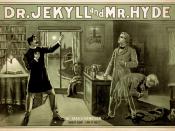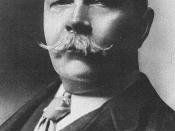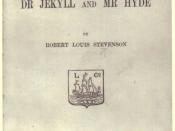There are many ways in which text (books or film) can be analyzed. One way is by the means of psychoanalysis. One well-known psychoanalyst is Sigmund Freud. Freud came up with numerous theories that deal with how people act it their conscious as well as unconscious minds. On of his theories is that people are controlled by their id, ego, and superego. A person's id is the source of psychic energy derived from instinctual needs and drives. On the opposite side of the id is the superego, which represents internalization of parental conscience and the rules of society. Finally the ego serves as a mediator between the superego and the id. Throughout one's life, there is a constant battle between the id and the superego. In the detective fiction genre, the superego of the main detective is being overpowered by his/her id.
The id of each detective is unique and distinctive.
In the short story A Scandal in Bohemia, by Sir Arthur Conan Doyle, the main detective Sherlock Holmes shows the reader his id through the use of cocaine. As defined earlier the id consists of needs and drives. For Sherlock Holmes the use of cocaine overpowers his superego, and is taken over by his id. Holmes use of cocaine is described to us by Watson, " "æburied among his old books, and alternating from week to week between cocaine and ambition, the drowsiness of the drug, and the fierce energy of his own keen nature.". (Doyle p.1) Cocaine and ambition essentially is the same thing for Holmes. They are both desires, and they can both be interchanged between one another. Although cocaine use was legal at the time of the story, it still can be seen as a strong unconscious desire. On the conscious level, or the...


